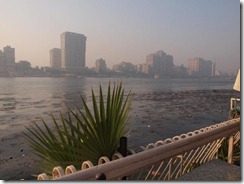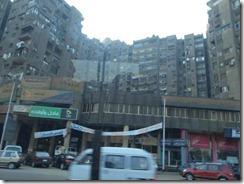Judging by the recent events in Cairo and Alexandria, we chose a very apt time to visit Egypt in early December last year. Not more than about eight weeks later, the people have begun wide spread protests and the future of the entire country is in doubt.
Now, in hindsight, it is possible to see the roots of the current events. When we arrived in Alexandria on the 30th of November, it was just after a major election and we were told that the election outcome was already known – before the ballots had been counted. The general feeling (apparently) was that the elections had been fixed, and that voting didn’t matter.
At the time, I pretty much dismissed this information as a case of ‘the usual process’, elections for show rather than to reflect actual political change and I suppose for a time this must have been how the locals felt; coupled with a touch of apathy. Something obviously changed in the most recent “election”, and that hypothetical apathy obviously disappeared to be replaced with an all too real displeasure, which has now blossomed into action.
I’m not an expert on the social state of Egypt, I’ve only visited the once, but even in those two days I could pick up on the unrest in the cities. In Cairo, people milled alongside the Nile (covered in garbage and sludge), and around Cairo the living conditions could be best described as slums. The average citizen doesn’t have much of a chance at owning an apartment, short of coming up with the entire purchase price in cash.

Garbage floating along the Nile
Poverty is a problem in Egypt too; recently it has been found that Egypt has one of the highest incidents of waterborne disease* (typically gastro infections) potentially overtaking India in this regard. From what we saw in our two days between Alexandria and Cairo, it’s not hard to believe the findings are accurate.
Although there are plenty of up market, five star options for accommodation and cuisine in Egypt, there are plenty of dirty, dingy poverty stricken areas, especially in Cairo and the quality of drinking water is poor at best. Many buildings are unsafe and/or outside the protection of the authorities. What could the people of Egypt do to find faith in leadership which allowed this to happen, or who did little to improve the living conditions?
The people we saw and interacted with were a mix. There were people who were obviously well educated and prospering, and then those who weren’t. They all had one thing in common – none had any power to change the leadership of their country. This combined fate was probably enough to lift the country into protests and violence and to unite with each other to force political change.
Slum tenements between Giza and Cairo
It’s interesting to consider the current state of affairs, when comparing Egypt’s two most recent presidents, who couldn’t be any more different.
Former President Anwar Sadat, who succeeded long time President Nasser, led his people through the October war of 1973 (which ultimately led to the Egyptian-Israeli peace treaty) and helped to reform Egypt domestically and economically (although with controversy) before his untimely assassination in 1981 paving the way for the current President Mubarak.
In contrast, Mubarak has held power for thirty years and in the past decade, under his rule, the economic situation in Egypt has gone beyond stagnation. His political appointments have been largely unpopular since 2004, and his bias towards privatization and favouring big business has probably contributed to Egypt’s 18% unemployment.
It’s not hard to see how the population would find the current state of affairs unacceptable. With a bleak economic outlook, and money running into the pockets of the well-to-do, coupled with a political system designed to prop up Mubarek unopposed, what option do the Egyptian people really have? What would you do in their place?
Hopefully this is the beginning of positive change in Egypt, because the Egyptian people need it, and with any luck the country will recover and find the stability it needs to continue developing in the twenty first century and beyond. Support the Egyptian people now, this is their most dire time of need.
* [ http://www.dailymail.co.uk/health/ ]
[ http://www.hpa.org.uk/web/HPAwebFile/HPAweb_C/1287146380314 ]
